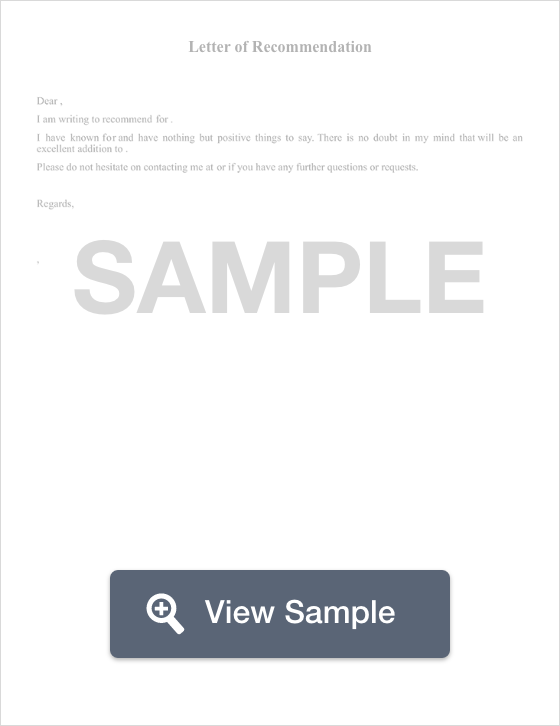Popular Types of Letters of Recommendation:
-
College Letter of Recommendation: A prospective employer or higher education organization may request a letter of recommendation to learn more about an applicant. A prospective student or employee may also request a letter of recommendation before they start applying so that they will be able to provide these entities with more information right away.
-
Scholarship Letter of Recommendation: Students will ask professors, former teachers, or volunteer supervisors to write a letter of recommendation to improve his or her chances of receiving a scholarship to pay for educational expenses.
-
Job Letter of Recommendation: When applying for employment, it is always beneficial to ask for letters of recommendation from former employers. With a letter of recommendation for a job, a prospective applicant can stand out from the pack.
Less Popular Types of Letters of Recommendation:
-
Education Related:
-
Academic recommendation letters have several distinguishing characteristics:
-
Specific Focus -- Education related recommendation letters often focus on the particular school the student is applying for, rather than being general or broad. They’ll often tie in facts about the school and parlay those into why the student would be a great fit.
-
Character Focused -- These letters often highlight the student's personality and character, providing specific examples as to why he or she would be a great fit for acceptance into the school or program.
-
Adherent to Submission Guidelines -- Oftentimes, schools or other educational programs will have submission guidelines that limit the length of a recommendation letter, or perhaps the format in which the letter must be submitted (i.e emailed, physical copy, certain margins, etc..)
-
-
Employment Related:
-
Support -- Employment recommendation letters display overall support of the candidate to a potential employer.
-
Explanation -- These types of letters also give an explanation of how the candidate came to be at a place where they are applying for this particular position. Is the candidate applying for this position because budget cuts did not allow them to stay at their previous job? Did the person outgrow their position? Employment recommendation letters explain the proverbial question that all employers want to know: “Why us?”
-
Structure -- Employment recommendation letters are structured, and not “all over the place”. They essentially answer general questions that employers want to know when considering new candidates. Those questions include:
-
“What are the candidate's accomplishments?
-
“What is this person’s commitment to the field?
-
“What is this person’s relationship with his or her colleagues, peers, and superiors?”
-
-
What a Letter of Recommendation Should Include & Not Include
-
A letter of recommendation should include:
-
A sample letter of recommendation should include information on who the person you’re recommending is, what specific skills they possess, and why you are recommending them. In other words, answer the question: “Who is this, and why should we accept them into our company or school?”
-
-
A letter of recommendation should not include:
-
Embellishments. Do not embellish a person's accomplishments, their character, their personality, or anything else in the letter. Colorfully describing a person is acceptable. For example, a colorful description of someone’s accomplishments would be:
-
“Jonathan put all of his efforts into scoring high on his SAT. In addition to hiring a tutor, he dedicated two hours each day after school to study his notes, flashcards, and practice his writing abilities.”
-
An embellishment would be:
-
“Jonathan put in more hours studying than anyone else in the region. He saved his money all semester to hire the top tutor in the state. His many hours of study finally paid off when he earned one of the tops SAT scores in the country."
-
-
Embellishments not only discredit your letter but it also greatly discredits the person you’re recommending.
-
-
How to Ask for a Letter of Recommendation
Asking for a letter of recommendation can feel just as awkward and daunting as asking someone for money. Letters of recommendation are not simple tasks that only take a few minutes out of someone's day. You’re asking a person to analyze your character, and petition an entity to accept you based on what they know about you in essay form. Nevertheless, there is a graceful and less stressful way to approach the matter, and we have included a guide to help you navigate the process.
Step 1: Who To Ask

The first question in your quest to receive a great letter of recommendation written on your behalf is who to ask. Since letters of recommendation are used for a variety of topics refer to the list below to see who you should approach depending on your situation.
A high school student applying to college or a scholarship
Choose a teacher that you have a good relationship with, and approach them about writing a college recommendation letter for you. This person should be a teacher who you’ve known for a long period--preferably one who has taught you before and knows your character.
A college student applying for grad school
Just like a student would in high school, choose a professor that you’ve had a lot of interaction with that knows you and has come to know your character. Some college classes can be quite large and some professors may have well over a thousand students in one semester, so be sure that you choose a professor that you’ve had enough interaction with that can effectively write a letter of recommendation.
Applying for a new job or new field with no related work experience
Ask a friend or an extended family member to write a letter of recommendation for you (sometimes known as a job recommendation letter). Generally, listing parents or immediate family members as references are generally discredited unless you’ve directly worked under them in business, and even then, recommendations and references still don’t hold much weight because parents and siblings will almost always give positive recommendations, while employers are looking for a more honest, and less biased analysis of your character.
Applying for a job with related work experience
Approach one of your previous supervisors who knows your work ethic and your character, preferably a previous supervisor you have a good relationship with who will write an honest (and positive) letter of recommendation. If a previous supervisor is not ideal, approach a previous or current coworker that you’ve had a good relationship with and who knows your character.
Step 2: How To Ask

Now that you know who to approach, the next thing to tackle is how. Asking someone to write a personal letter, such as a letter of recommendation for you, can be awkward. On one hand, you want to approach the person with a no-pressure pitch. At the same time, you need the letter by a certain time because you need it to apply for jobs, scholarships, and colleges. Here are a few tips to help ease approaching your peers, supervisors, or professors:
-
Approach the person: Asking a person face to face is much better, and much more personal than asking them via email or text message. Additionally, since emails and text messages are less personal, it is easier to disregard them or push them off. Approaching the person you have in mind and speaking with them face to face is much more compelling.
-
Explain your situation: This step may require some preparation. You want to start by explaining what you’re doing, and why you would appreciate a letter of recommendation from them. Be sure to mention how much the letter would help you, and what it would mean to you if they would write a letter of recommendation for you. Also, try not to sound too desperate or pushy. Instead, try to be gentle with your approach, while letting the person know when you would need the letter completed.
-
Express gratitude: Always remember to thank the person and tell them how much you’d appreciate them writing this letter to you. However, try not to give them the impression that you fully expect them to write this letter to you. They may later change their mind, or their schedule may not allow them to write a letter of recommendation for you. Thanking the person in advance in the expectation that they will complete the letter puts pressure on them.
When to reject a letter request
If someone approaches you and asks you for a letter of recommendation, there may be instances where your schedule does not allow you the time to craft one, or you simply don’t want to write one. These reasons are left to your discretion, however, here are two definite situations when you should always reject a letter request.
-
If you don’t know the person that well.
-
If you don’t know a person that well, you make attempting to write a compelling letter extremely difficult on yourself. If you don’t know a person very well and you attempt to embellish their strengths or personality traits, you may end up doing more harm than good. Your letter may end up painting an entirely different picture of the actual person you’re writing about.
-
-
If highlighting their strengths is a challenge
-
If you're tempted to write a negative recommendation because the person who has requested a recommendation has been quite troublesome or has floated under the radar the entire time you’ve known them, it’s always a good idea to reject their request for a recommendation letter and let someone else, who can better highlight their strengths, complete a letter for them.
-
How to reject a request
One great way to reject a letter request is to simply apologize, and say that you are too busy to write an adequate letter of recommendation for them or the quality of the letter that they deserve. However, you may also flat out say “no”. How you reject someone is left entirely to your discretion.
A Sample Letter of Recommendation with Examples For Each Step
Writing a letter of recommendation can seem like a daunting task. Sometimes the hardest part about writing a letter such as this is getting started. Once you finally get off to a good start you may struggle on how to properly organize and structure the document. Here is a step by step guide to help you do so:
Start with a personal greeting

You never want to start a letter like this with “To whom it may concern.” Instead, you want to include the person’s name and title. Such as: “Dear Professor Oglevee” or if you are addressing a group of people or an unnamed person, use their title or the name of the group. “Dear Dean of Admissions” or “Dear Board of Directors.”
Gracefully yet glamorously recommend the candidate

Try to avoid simple phrases like, “I’m a friend of…” and “I’m writing on behalf of..”. Instead, use phrases like: “It’s my pleasure to recommend” or “It’s an honor for me to introduce…”
Describe your relationship with the person

This is where you go into detail about how you’ve come to know the person you’re recommending. Describe how you came to know each other, and other things like the length and aspect of your relationship.
Color the applicant with praise

Avoid going overboard. You want the letter to be honest, but also colorful. Paint the person's character, highlighting their key strengths, personal qualities, and academic, or leadership abilities.
Explain why the person is transitioning

Give a brief description of why the person wishes to be with this school, place of employment, or receive this scholarship.
Encourage the entity to accept the applicant

This doesn’t have to be a statement where you’re begging and pleading for them to accept the person you’re recommending. This can be as simple as a sentence like “I am confident that ….. will be a great addition to your school/team/program.”
Sign

Before you sign your name at the bottom of the page, be sure to include some closing remarks before kindly giving your regards and ending the letter.
Steps to take before writing a letter of recommendation
Before you begin writing a recommendation letter for someone, there are a few steps you may want to take so you can write the best, well-informed letter that will accurately highlight the person and their accomplishments. Here are a few helpful tips to follow before you begin writing.
-
Gather information from the applicant: Gather helpful information from the applicant, such as their resume, cover letter, and list of aspirations that may help you write a better letter.
-
Do your research: Research the school, company, or scholarship that the person is applying for and try to weave in your letter how your friend, colleague, or acquaintance would fit perfectly with them.
-
Consider the Tone: Keep in mind the type of letter that you are writing, and who you are writing the letter to. A letter of recommendation to a laid-back tech start-up company will have a very different tone than that to an Ivy-league graduate school.
Email Letter of Recommendation
When emailing a letter of recommendation, you essentially follow the same steps that you would with a physical letter of recommendation; still including the same components, and conducting the same research. One main difference is that since this is a digital correspondence, you do not need to include your contact information at the heading of the letter. Instead, include that information at the bottom, underneath your name. See the example below:
-
Kindest Regards/Sincerely/Best Regards,
-
Your first and last name
-
Your job title (about the person)
-
Your email
-
Your phone number
-
Your company
-
Your address
Additionally, in the subject line of the email, simply type “Recommendation” and the applicant's name. Ex. “Recommendation -- Applicants Name”
Letter of Recommendation Examples
Below are a few additional resources that provide sample recommendation letters, as well as a letter of recommendation templates to further guide you toward writing a strong recommendation letter.
Writing a Letter of Recommendation & Six Letter of Recommendation Samples
If you’re asked to write a letter of recommendation, it could feel overwhelming. Many people in your position tell the person requesting it to just write something up for them to sign. Instead of doing that, we’ve put together the following three steps with samples to help you quickly and easily write a recommendation letter.
Step 1 - Drafting the Introduction
All letters begin with an introduction. A recommendation letter is no different. Your introduction should address the individual or organization to which the letter will be sent. Introduce yourself as the writer, introduce the candidate, and explain your relationship as well as how long you’ve known the candidate. Finally, make sure that you specifically mention the reason that you are writing the letter. For example, someone asked you to recommend them for a specific job.
Sample #1
To the Admissions Committee of Anytown National College:
My name is Robert P. Jones. I am a high school guidance counselor for Small Town High. I’m writing to you to recommend Katharine Alice Smith as an excellent student for your campus. I’ve acted as both Katharine’s guidance counselor and academic advisor for the last three years. In addition to doing very well in her studies, she’s also participated in extracurricular activities that I believe will help prepare her both for college and as a future professional.
Sample #2
July 6, 2020
Dear Dr. Johnson,
My name is Dr. Jennifer Martin. I am the sole practitioner of Little Town Medical. I’m writing this letter of recommendation for Karen White, RN. Ms. White has worked both as our main RN and as our office manager for the last five years. During this time, not only has Ms. White established fantastic working relationships with our patients, but she’s also improved our back-office efficiency by 15% in just the last year.
Step 2 - Write the Body of the Letter
After the introduction, you’ll write the body of the letter. In the body, you’ll address the applicant’s skills, qualifications, and related accomplishments that you believe make them a good fit for the position. You must provide well-written examples to validate your position as a credible source. Before you write this portion of the letter, talk with the applicant so that you understand the purpose of the letter.
Sample #1
When Karen first joined our medical office five years ago, she had no professional experience outside of her internship. However, her naturally empathetic personality, her readiness to learn, and her willingness to take on extra responsibilities made her the perfect nurse for our office.
Karen worked with patients, other medical professionals, and our back-office staff to help ensure a smooth overall experience for our patients. Karen was never late to work. Her only absences were documented with a doctor’s note or were pre-planned and approved. Karen was always willing to help new staff members understand our policies and procedures.
Sample #2
Daniel began volunteering with our organization three years ago. Initially, he started in the warehouse. As time went on, Daniel began to attend our volunteer meetings where we would discuss marketing campaigns. He volunteered to assist with the creation of content for our website.
Daniel took time out of his schedule as well as used his own money to attend a copywriting course so that he could help our charity reach its overall goal of creating an engaging website to explain to potential donors who we are and what we do. We launched our new website at the end of the second quarter. As the Fundraising Manager, I can see an improvement in our Q4 donations compared to the previous three years.
Step 3 - Write the Conclusion
The final piece of a letter of recommendation is the conclusion. This section provides your opinion about the applicant’s qualifications and abilities. You should also re-state your support. Make sure that you provide the reader with a way to contact you if they have any questions.
Sample #1
Samuel’s unwavering devotion to the responsibilities here during his internship gives me the confidence to say that I’m convinced he will be an asset to your graduate program. In addition to his personal and professional ethics, Samuel is also well-spoken and has a knack for getting along with people from all backgrounds. If you have any questions, please do not hesitate to call me during my office hours or to send me an email.
Kindest Regards,
Signature
Printed Name
Position
Phone Number
Email Address
Sample #2
While I certainly wish that Manuel would remain with our organization forever, I also understand and appreciate his desire to do something that closely aligns with his ultimate goals. Without a doubt, we would certainly rehire him in the future. His talents and work ethic are an asset to any company. If you have any questions or concerns, please call me or send me an email.
Sincerely,
Signature
Printed Name
Position
Phone Number
Example Recommendation Letter - Program Director
September 1, 2020
To the Members of the Hiring Committee:
My name is Raymond Alexander. I am the CEO of ABC Media which owns five AM radio stations and two FM radio stations reaching the tri-city area here in our state. As the CEO, I’ve worked with Mark Henning for the last ten years as his direct supervisor. As the CEO, I’ve had the pleasure of watching Mark start as a fill-in DJ and rise through the ranks to become our Program Director.
Although he is the Program Director, Mark never hesitates to fill in as a DJ or event host as needed. He is also our main media contact and attends local fundraising events on our behalf. While our marketing budget has declined over the last few years because of online mediums, Mark has continued to find new and innovative ways to not just keep listenership steady but to increase it each quarter. We have not reduced or eliminated the position of the Program Director. However, we certainly understand Mark’s desire to move into a bigger market.
Mark began with our organization ten years ago directly after he completed ABC Technical College’s radio broadcasting program. He volunteered to help in any capacity we needed. He’s worked overnights, lunch hours, and even the rush hour drive time. He’s also helped our sales department by both writing and recording 30-second spots for advertisers.
We are extremely fortunate to have worked with Mark for the last ten years. We certainly don’t want to lose him, but we also appreciate and support his desire to grow in a professional capacity. His passion and devotion to the industry make him a valuable asset for any media company. If you have any questions or concerns, please give me a call or email me. I’d be happy to answer any questions you have.
Sincerely,
Raymond Alexander
CEO, ABC Media
XXX-XXX-XXXX
email@email.com
Example 2 - Office Manager
September 28, 2020
Dear Mr. Thompson,
My name is Jeremy Smith. I am the owner of Smith Heat and Air, LLC. I am writing to you in regards to Linda Bell. Ms. Bell has worked here for the last five years as our office manager. She’s been an essential part of our HVAC team by handling payroll, taxes, schedule installs and taking care of our Human Resources matters. As a small office, having Linda as part of our team has been a wonderful experience.
We work with a lot of local builders and we have a team of 20 professionals who work on jobs. Linda has balanced both internal Human Relations and payroll issues along with scheduling installs with phenomenal professionalism. She’s highly organized and a self-starter. Linda takes the initiative to call and follow up with manufacturers as well as with city inspectors.
While we would love for Linda to remain with our organization, we also understand her desire to move forward into another office manager position that makes more use of her professional skills and education. I am confident that Linda would make an excellent office manager for your business. If you have any questions, please give me a call or email me.
Regards,
Jeremy Smith
Owner, Smith Heat and Air, LLC
XXX-XXX-XXXX
email@email.com
Forms Related to a Letter of Recommendation
-
Resignation Letter: A Resignation Letter is a written document that you provide to your employer to disclose your decision to leave the business.
Download a PDF or Word Template
Letter of Recommendation
A letter of recommendation can be used by students or by people in need of a job. This template will help the writer draft a letter of recommendation.
 Read More
Read More
Employee Evaluation Form
Employee evaluation forms offer a structured way for employers to give constructive feedback to employees, in order to further the business interests and support employee development.
 Read More
Read More
Resignation Letter
A resignation letter is a short formal letter notifying an employer of your wish to leave a current post. It is a 'good will' document and may detail the term of employment, job role, date of departure and any personal comments.
 Read More
Read More
Independent Contractor Agreement
An independent contractor agreement establishes the legally enforceable obligations and rights of a company carrying out work for another company. It protects both parties against breach of terms in the case of dispute.
 Read More
Read More

